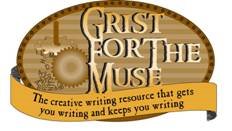Obviously I’ve been struggling with keeping a blog. The Grist for the Muse newsletter hasn’t gone out since sometime in 2006 and I feel as if I still have not found my voice in the blogosphere. So here is what I’m going to do. Write my own manifesto. That’s right a manifesto. I don’t want this to be a forum where I talk to myself about the hardships of the writing life. Really. I am boring. I am the most boring subject out there. So much so I bore myself with my own blog entries. So here is what I’m going to do for the next 6 months: an experiment to see what I should do with this platform I’ve created:
- Not to rely so much on my experiences and knowledge for the blog. You can get that anywhere on the web. I’ll still put together original articles and content, just not rely on it as much as a basis for the blog.
- Post cool things of interest to writers that I stumble across on other blogs and web-pages.
- Inject my “humble” opinions on these items of interest, when applicable.
- Not be so afraid to inject my “humble” opinions on those items of interest, the writing life, or life in general. I have, at times, held back on writing about something that might not sit well with some of the people I know, or backtracked when presenting an honest, but cutting review (after the author of the reviewed book contacted me). This is the politically correct “teacher-side” of me that emerges often to edit out my unkind thoughts. I need to stuff the teacher-side back into the tiny junior high school locker, where he belongs. I have definite likes and definite dislikes, and I will share them.
- Post more often. At least once a week, although I’d prefer to make a habit of posting 2 or 3 times a week, to keep you coming back to see what’s going on.
- Continue to produce “Muse Reviews” for not only books about writing and creativity, but expanding them out a little further with reviewing books in general (and perhaps the occasional movie or TV show) that are either really good or really bad and why.
- Actually answer and thank those who take the time to leave comments on my posts. With apologies to Ched, Nita and Alanna. I am embarrassed to say that I always meant to respond to your posts, but something in my scrambled ADHD mind always seemed to get in the way, and then so much time had passed since you posted a comment that it was awkward figuring out just how to respond: “Thank for the comment you left 9 months ago, it was really important to me.” And it is, I just didn’t say this with my fingers. I thought kind thoughts in my head and felt pangs of extreme guilt and embarrassment every time I saw them when I opened up the blog.
- Share my journey (the struggles, failures and successes) and try to be honest and uncensored, and allow you to see how I-don’t-have-it-together-at-all. And funny. I have been told I’m funny… and I really am sometimes. Because let’s face it, writing is a crazy thing to do and crazy is always funny… well maybe not always…
- Stop being such a technical idiot. Learn to format these entries so they can be easily read. Maybe how to put a nifty picture or two in ‘em from time-to-time. I’d like to overhaul the design of this while I’m at it… but not right away.
- Stop being such a perfectionist. There are times where I sit on a good topic, or I write and write about it (but more often than not, think and think about it, not writing at all). And get complete stage fright, where I revise and revise whatever piece I have, worrying about how it will be seen by my students and complete stranger who have expectations when they visit the blog. I need to get in the habit of thinking on the page again, in front of an audience. And not ramble on and on so much…
- Be entertaining. There are so many interesting and engaging writers out there. I want to be like them.
- Continue the Shameless Self Promotion. A guy’s gotta eat, right?
- Be available to answer your questions.
- That these guidelines of this manifesto are fluid and subject to change as determined by my mood, audience response, and interests change.
So there you have it. The Grist for the Muse Manifesto. Thoughts?
